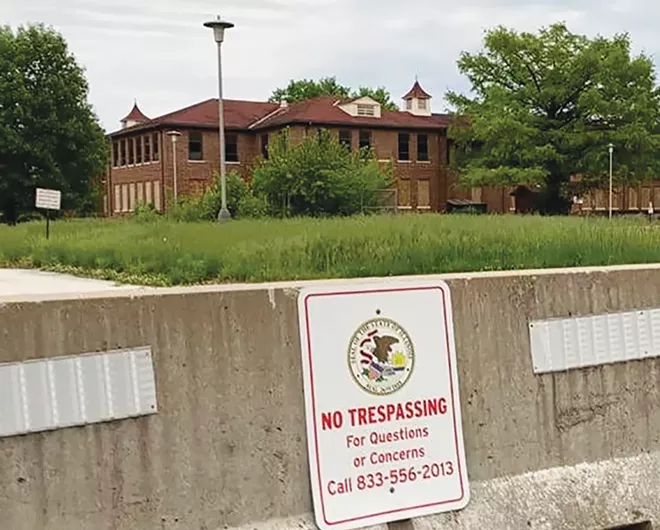
It's said one person's junk is another's treasure.
In that vein, a budget proposal before Illinois lawmakers would use $500 million to turn some of Illinois' biggest state-owned eyesores into economic development opportunities.
Abandoned, dilapidated facilities in Lincoln and Jacksonville are among five across Illinois that are targeted in the "Surplus to Success" program being advocated by Gov. JB Pritzker.
Once-large facilities that served the intellectually disabled such as the Jacksonville and Lincoln developmental centers have become unsightly obstacles to reinvigorating the economies in those small towns.
The plan unveiled last month during Pritzker's budget address received high praise from state Sen. Sally Turner, R-Lincoln. But she is quick to point out that at this point it's just a proposal awaiting lawmakers' approval.
"Our problems started in 2002 when we lost the Lincoln Developmental Center, and then it kept on a downward spiral," Turner said. "We lost the two colleges: Lincoln College and Lincoln Christian. We need some economic growth. And where we sit is just ripe for economic growth. ... This is a perfect opportunity for us to have some kind of revitalization."
The town of 13,300, 30 miles north of Springfield, is in a remarkably similar economic predicament to Jacksonville, a community of 17,600 people 35 miles west of the capital city.
Both have the ruins of long-abandoned state facilities as unsightly reminders of decades of community economic decline.
Like Lincoln, Jacksonville has seen its industrial base decline and its proud heritage of higher education take a hit. MacMurray College, a 174-year-old institution, shut its doors permanently in 2020.
The site of the former Jacksonville Developmental Center is a community albatross, contends Ben Cox, who heads Moving Jacksonville Forward, a newly formed citizen group intended to focus attention on the issue.
"The buildings themselves have been a haven for the unhoused in Jacksonville for at least the last five to six years. There are tunnels that go underneath all the buildings and those are now flooded.
"Now some of the lower levels of the buildings have flooded, too. They're full of black mold, full of stagnant water. Some of the buildings themselves were already condemned prior to the shuttering of the facility. Those have asbestos and lead paint in them. And then there's also a coal-fired power plant that sits on the very southwest edge of the campus. That is a giant ecological disaster waiting to happen if it were to fall in," Cox said.
The 100-acre, 18-building campus sits in the middle of Jacksonville and firefighters are frequently called there to extinguish flames.
"It's a giant safety concern. It sits right next to our beautiful community park, which is used by the public all the time," Cox said.
Lincoln Mayor Tracy Welch has similar concerns about the LDC site.
While a portion of the 100-acre campus has a newly constructed, soon-to-open juvenile-detention facility, most of the site is in deplorable condition, he said.
"Roofs have collapsed. There's asbestos in the buildings. A lot of the windows are boarded up. They are the epitome of blighted properties," Welch said.
Pritzker's proposal calls for allocating $300 million to mitigate environmental hazards and make the blighted properties ready for businesses to locate there. Another $200 million would go to the Department of Commerce and Economic Opportunity to promote large-scale and specialized projects for the sites in Lincoln and Jacksonville as well as for other vacant state properties in Dwight, Rockford and Kankakee.
Just what shape those projects might take remains to be seen.
"There's been some ideas kicked around in the community," Welch said. "It could be new manufacturing. It could be distribution centers. It could be more housing, mental health services. Veterans' tiny homes was a project that's been talked about.
"So, there's lots of ideas, but we just aren't at that point yet with the governor's office to know what the future holds for that property."
Kristin Van Aken Jamison, president of the Jacksonville Regional Economic Development Corporation, expressed enthusiasm for the state's proposal.
"The exciting part of the story is that there's so much great synergy between the city of Jacksonville and the state of Illinois right now. They want to figure out how to deal with this property that needs to be remediated. Our mayor has worked behind the scenes on this for years. ... Thankfully, the governor has taken note of properties not only in Jacksonville but in other places in Illinois, and realizes the need to remediate these places so that they can be put back into what we anticipate will be private hands to be moved forward."
Jamison's counterpart in Lincoln, Andrea Runge, CEO of Lincoln Economic Advancement and Development, Inc., said the governor appears to be throwing a lifeline to the community.
"I'm just happy that we're at a point where we're thinking about those surplus real estate assets differently and ready to look at them as economic drivers for communities that have been saddled with the leftovers of those (state facilities).
"There are a lot of potentials there to look at: small manufacturing, logistics, distribution. All those would be a good thing, in my estimation. ... I'm always going to be hopeful that there is a way to take that kind of surplus real estate and create jobs for the people who live here in Lincoln and Logan County."
